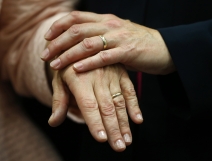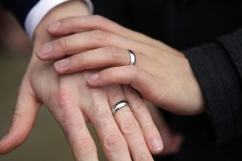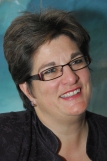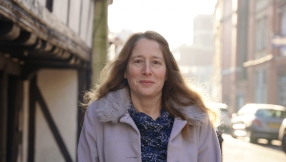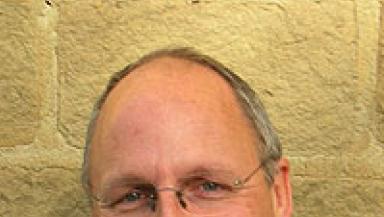
The Dean of St Paul's has called for the Church of England to consider what accepting same-sex marriage would mean for the future.
The Church of England is seen by many as "toxic" and "oppressive" because of its stance on women and gays, he said. Some gay Christians had even committed suicide because of the pressure of being told they had to be celibate.
Dr David Ison says today: "We need to consider what the acceptance of same-sex marriage in the Church would mean in reality, and how it would be understood in relation to the theology of Christian marriage and the chequered history of that institution, as well as contemporary social practice around sexuality."
Dr Ison, who was brought up in the conservative evangelical tradition but changed his mind about homosexuality after meeting gay Christians at university and witnessing first-hand the damage done by the traditional teaching, added: "We are in a situation where because of its views about women and about gay people, the church has been seen as toxic or oppressive.
"That breaks my heart, that that should be the case, when the church is there to bear witness to freedom, life and hope in the world. Let's see what we can do to change that."
He was speaking to Christian Today on publication of his open letter about sexuality on the website of Accepting Evangelicals, the organisation now headed by former Archbishops' Council member Jayne Ozanne, an influential evangelical who recently came out as gay.
Dr Ison, married with four children, says in the letter he is promoting the idea of "good disagreement" where groups in the church agree to disagree but to live together. The concept underpins the "shared conversations" which enter their second phase soon and continue until 2016 in an attempt to hold the Church together.
There is suspicion in some quarters that the conversations have an agenda pre-determined towards change. Already the conservative evangelical group Reform have said they will not take part.
However Dr Ison says that although he himself changed his own mind, all he hopes is that the warring parties will find a way to live together, while disagreeing, and avoid schism. As Dean of St Paul's, the fact that he is not a bishop leaves him in a key position to speak out freely. His views will carry great weight across all levels of the Church, government and society.
Dr Ison told Christian Today: "I've seen in my pastoral work plenty of angst around the whole area of sexuality, particularly dealing with people who are homosexual, about how the double life they've felt pushed into has been a huge strain, an emotional and mental strain. I've known one or two people who've committed suicide because of the pressure they've been under."
These were people who had "faithfully" tried to live out what the church asks for in terms of sexual morality, which for homosexuals is celibacy.
There was no evidence in the Gospels that Jesus differentiated between homosexuals and heterosexuals, he said.
"The reality of my encounter over the years, particularly with Christian gay people, has led me to question the rightness of the interpretation of Scripture, that simply to be gay means you must be celibate."
He admitted the conservative view was the one with 2,000 years of tradition on its side. "And yet, the question doesn't go away and you have to ask the question, is it actually working? And where we are now raises the questions in a different kind of way from the kinds of questions St Paul was facing in the culture he was in."
One example of an older culture on the Church was everyday sexism. "I was talking to somebody about a statue of a bishop in St Paul's. He's safely dead, many many years ago. And they said oh yes, he was well-known as a bottom pincher. You just think, how can you square that with being a christian minister, that you will trespass upon the person of women."
Although he admitted that passages in the letters of St Paul were against homosexuality, he called for a broader approach today.
"You look at the lists in St Paul's letters about the things that you should get upset about. Maybe one or two are about sex. Lots of them are about things like anger and hostility and greed and other things which we don't make anything of in terms of how we should, say, associate with a person because they are greedy or unkind. Where you draw the line is very much determined by what your particular fashion of the moment is. We need to have a much broader approach to scripture rather than fixing on a few texts which seem to determine the argument one way or the other."
In his open letter, Dr Ison questions why the focus is on homosexuality. "After all, far more damage is done in and to the Church by misbehaving heterosexuals than by gay people," he writes.
He recommends the strategies used to consecrate women bishops, or to engage in dialogue with other faiths, could be adopted over the gay issue.
"I have seen and heard of so much pain and spiritual destruction that has come out of the Church's refusal to embrace the equality of women and gay people before God, and from its refusal to accept the reality of its own discrimination against people for who they are," he writes.
He adds: "The Church still struggles with how to affirm in practice people of black and minority ethnic and Jewish backgrounds: but if we were to be discussing the question of whether or not they are equal before God, we would rightly be condemned for our racism or anti-Semitism, even though such prejudices have been scripturally justified in Christian history.
"Why then do we think it still acceptable in parts of the Church to speak about and treat women and gay people as a 'them', as a problem to work around rather than as a part of our own Christian body?"
Jayne Ozanne, director of Accepting Evangelicals, warmly welcomed the open letter and described it as a "seminal contribution" to the shared conversations process. She told Christian Today: "As David has so powerfully explained - we need to find a new way of engaging with each other on this highly sensitive topic. Too many lives have been permanently scared - and sadly many tragically lost - over this heart breaking issue. We need to humbly recognise and honour that, no matter what our theological position. I think we would also do well to remember that although the gospels make no mention of Jesus addressing the issue of homosexuality directly, they make plenty of references to his confrontations with those who lived by the letter rather than the spirit of the law."











